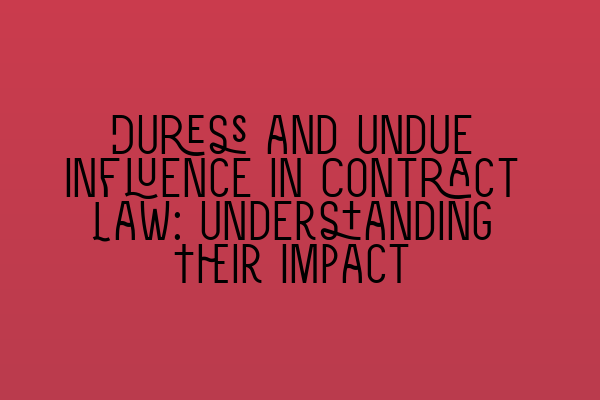Duress and Undue Influence in Contract Law: Understanding Their Impact
Welcome to our blog post about duress and undue influence in contract law. In this post, we will explore the concepts of duress and undue influence and discuss their impact on contract formation and enforcement. Understanding these legal principles is crucial for solicitors and anyone involved in contract law. So, let’s dive in!
What is Duress?
Duress refers to situations where one party exerts pressure or force on another party to enter into a contract against their free will. The coercion may be physical, psychological, or economic. When duress is present, the contract is considered voidable, meaning the party subjected to duress has the option to either affirm or rescind the contract.
It’s important to differentiate between legitimate forms of persuasion or negotiation and duress. Duress involves wrongdoing or unconscionable behavior that negates the voluntary consent required for a valid contract.
For a more detailed understanding of duress and its application in contract law, you can refer to our MCQ practice quiz on SQE 1.
Undue Influence: A Probing Examination
Undue influence, on the other hand, occurs when one party takes advantage of their superior position or relationship to manipulate another party into entering a contract. This influence can be exerted through coercion, deceit, or exploitation of the vulnerable party’s trust and confidence. Similar to duress, a contract entered under undue influence is also voidable.
It’s essential to identify the elements of undue influence: the existence of a special relationship, the exercise of persuasion, the resulting loss of independent judgment, and the unconscionable advantage taken by the dominant party. Understanding these elements can help determine whether undue influence is present in a particular contract.
If you want to explore further and test your knowledge on undue influence, you should check out our SQE 1 practice mocks FLK1 FLK2.
Practical Implications and Legal Consequences
Duress and undue influence can have significant implications for contract validity and enforceability. If a contract is found to be tainted by duress or undue influence, the injured party may seek remedies such as rescission, restitution, or damages.
The burden of proof lies with the party alleging duress or undue influence, making it crucial to gather and present sufficient evidence to support their claims. Consulting with an experienced solicitor who specializes in contract law is recommended in such cases.
Conclusion
Understanding duress and undue influence is essential for professionals in contract law, as these concepts play a crucial role in determining the validity and enforceability of contracts. By recognizing the signs of duress and undue influence, solicitors can protect their clients’ interests and ensure fair and equitable contract negotiations.
If you want to enhance your understanding of contract law or prepare yourself for the SRA SQE exams, you can explore our comprehensive SQE 2 preparation courses and SQE 1 preparation courses.
For more information on exam schedules and upcoming dates for the SRA SQE exams, please refer to our page on SRA SQE exam dates.
